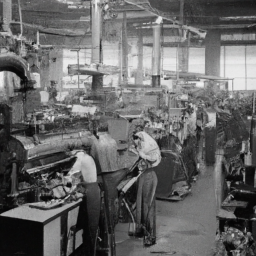Introduction
As the United States rapidly transformed into an industrial powerhouse in the late 19th century, state governments recognized the need to regulate the booming industry. Pioneering the path towards industrial progress, states began enacting legislation as early as 1869 to oversee various aspects of industrial operations.
Inception of State Regulations
The inception of state regulations on industry marked a significant shift in governance. These regulations aimed to strike a balance between promoting economic development and safeguarding public welfare, laying the foundation for future federal regulations.
Economic Development
State regulations on industry were driven by the desire to foster economic growth. Legislators recognized that ensuring fair competition, preventing monopolies, and promoting innovation were crucial for a thriving industrial sector.
Consumer Protection
Another key motivation for state regulations was the protection of consumers. Legislators sought to establish standards for product quality, labeling, and fair pricing to safeguard the interests of the public.
Worker Rights
State regulations also focused on improving working conditions and protecting worker rights. Laws were passed to regulate working hours, establish minimum wage standards, and enforce workplace safety measures to address the exploitative practices prevalent in many industries.
Environmental Conservation
Recognizing the environmental consequences of unrestricted industrial growth, states began implementing regulations to protect natural resources. Laws were enacted to prevent pollution, regulate waste disposal, and promote sustainable practices, ensuring a balance between economic progress and environmental preservation.
Technological Advancements
State regulations played a vital role in promoting technological advancements. Legislators encouraged research and development, offering incentives for industries to adopt new technologies and improve efficiency, thereby enhancing overall productivity.
Growing Influence and Collaboration
Over time, state regulations on industry gained considerable influence, prompting collaborative efforts between states and the federal government. This interplay between state and federal regulations paved the way for comprehensive legislation aimed at addressing national concerns.
The Role of Congress
While states were at the forefront of industrial regulation, Congress played a crucial role in shaping and refining these regulations. Federal lawmakers recognized the need for consistent standards across states, leading to the gradual establishment of federal regulations to complement state efforts.
The Impact on the White House
As state regulations on industry evolved, the White House became increasingly involved in coordinating federal regulations and ensuring their effective implementation. The executive branch played a vital role in overseeing the enforcement of industry-related legislation and addressing any interstate conflicts that arose.
Achieving National Security
The regulation of industry by states indirectly contributed to national security by ensuring economic stability and preventing harmful practices. By protecting consumers, workers, and the environment, state regulations acted as a bulwark against potential threats to the nation's well-being and security.
Contributions to Gun Laws
While state regulations on industry primarily focused on economic and social aspects, they indirectly influenced gun laws. By establishing a framework for legislative processes and highlighting the importance of regulation, state efforts paved the way for subsequent discussions and debates surrounding gun control.
International Implications
State regulations on industry set a precedent for other nations grappling with their own industrial revolutions. The United States' pioneering approach to regulation became a model for international discussions on balancing economic growth, social welfare, and environmental sustainability.
Concluding Thoughts
From its humble beginnings in 1869, state regulation of industry in the United States has come a long way. By pioneering legislation in areas such as economic development, consumer protection, worker rights, and environmental conservation, states laid the groundwork for comprehensive federal regulations. Their efforts continue to shape the nation's industrial landscape and inspire other countries to strike a similar balance in their own industrial progress.
